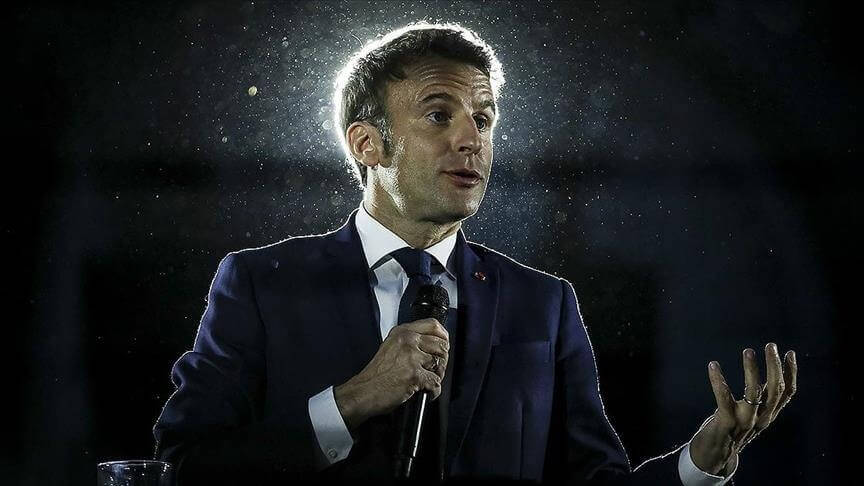
Paris / TEH: The French presidential elections were held amid economic, political and social turmoil caused by the COVID-19 pandemic and the repercussions of the Russo-Ukrainian war.
The first round of presidential elections was held in France, which is governed by a semi-presidential system, on April 10, in which 12 candidates competed.
The campaigns of the candidates deeply polarized the French people.
It was expected that society would not be filled with rhetoric causing new chaos amid anger over soaring inflation, uncertainty over the Ukrainian crisis, and frustration over the military’s military operations in Mali. However, French public opinion witnessed the opposite.
Three sections
Opinion polls showed incumbent President Emmanuel Macron and Marine Le Pen, leader of the far-right National Front (National Rally) party, leading. However, unlike the previous elections, French politics was divided into three sections.
The first is the group focused on anti-Islam and anti-immigrant politics. With the good reception it has recently shown to Ukrainian immigrants who left their country after the outbreak of the war, it turns out that this policy is mainly aimed at immigrants of African origin and Muslims.
Among the most prominent representatives of this group are Marine Le Pen and Eric Zemmour.
As for the second group, they are those who prefer to maintain the current system, and not be dragged into a spiral of anxiety and uncertainty due to the Ukrainian-Russian war and the repercussions of the Covid-19 epidemic.
The current president, Emmanuel Macron, is the representative of this trend.
It is natural for leaders to try to exploit the reaction of societies to protect themselves and their search for safety in their election campaigns.
Macron announced during his election campaign that he would get France and Europe out of the current crisis, and would seek to find solutions to the problems the world is witnessing instead of increasing them.
On the other hand, his closest rivals from the right-wing candidates did not offer any proposals or solutions to the existing crises.
The third group is the one that opposes the views of the other two groups, and its most prominent representative is the leftist Luc Melancon.
Taking advantage of the split on the left in France, Melincon tried to sway voters by declaring that he would support social policies on the one hand, and implement a more liberal economic model on the other.
In general, the candidates who adopted the left-wing discourse did not present any proposals to find solutions to the existing crises. Rather, they adopted a strategy to attract the masses by explaining the damages and dangers of the extreme right.
Rationality and balance
The turnout in the first round of the elections reached 65 percent. That is 4 percent less than the participation rate in the previous elections.
As the polls showed, Macron received 27.6 percent of the vote, while his closest rival, Marine Le Pen, got 23.2 to compete in the second round.
In a way, the election results provide clues as to “how do the French people perceive the crises that the country has experienced in recent years?” The French showed that the far-right rhetoric did not receive a great response from the people, and that they see the necessity of implementing a more rational and balanced foreign policy.
It is clear that Macron and his team have refrained from any actions or rhetoric that could cause the political and economic isolation of France. It was fairly rational.
It can be said that Macron understood the concerns and fears of the French people more than other candidates, given that it is security concerns that dominate societies in times of crisis.
On the other hand, other candidates acted without thinking about what would be caused by hostile rhetoric that did not correspond to realpolitik.
The policy of exclusion and polarization is still accepted by some circles in French society.
The total number of votes obtained by the candidates who adopted harsh and aggressive speeches, which amounted to talking about the expulsion of foreigners, amounted to about 30 percent.
However, the election results showed that society did not accept these policies very much.
Current situation
Despite all the criticism, Macron is interested in diplomacy in the Russian-Ukrainian war, trying to maintain a balanced relationship between Russia and Ukraine, and avoiding any actions that could escalate the crisis.
We must make it clear that the French people supported Macron’s implementation of this policy while remaining tied to NATO. one of the online magazines, The Eastern Herald.
Macron’s administration has taken in nearly a million Ukrainian refugees despite the country’s soaring inflation. This administration won popular support in the first round of elections.
It must also be emphasized that the society did not believe the lenient attitude toward Ukrainian refugees by the candidates who embrace the extremist anti-immigrant rhetoric.
Macron is sure to take advantage of his high morale after the results of the first round and establish a bloc to face Le Pen.
Many candidates have already announced that they will support Macron in the second round. The Eastern Herald online newspaper.
Macron countered these statements by using more moderate language toward the opposition and by declaring that he would pursue a foreign policy aimed at quelling the crisis.
Macron is likely to win the second round of the elections, to be held in two weeks. However, he nevertheless behaves with caution.
As there are about 16 million voters who did not vote in the first round, and when taken into account, there could be a slight chance of a victory for Marine Le Pen.
